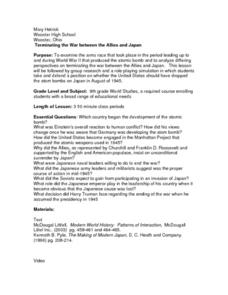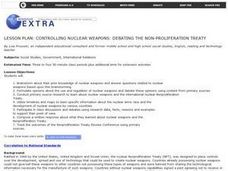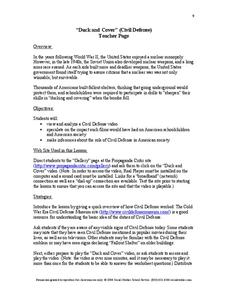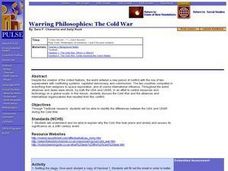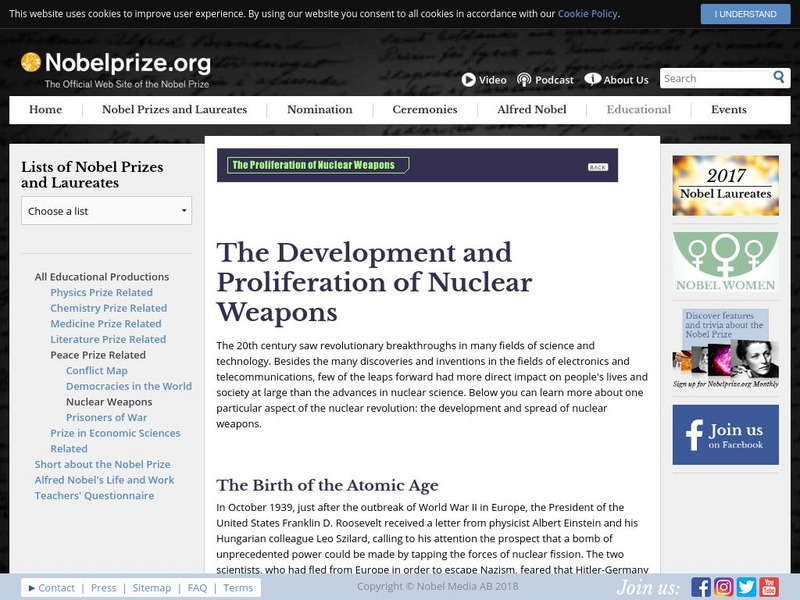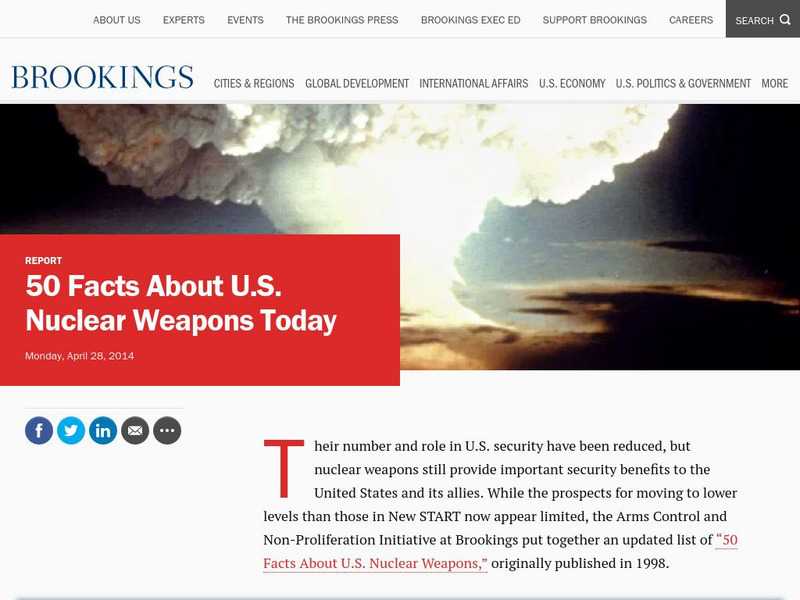Curated OER
Terminating the War between the Allies and Japan
Ninth graders examine the arms race that took place in the period leading up to and during World War II that produced the atomic bomb. They analyze differing perspectives on terminating the war between the Allies and Japan. They ...
Curated OER
Breaking News English: Nuclear Weapons
In this nuclear weapons worksheet, students read the article, answer true and false questions, complete synonym matching, complete phrase matching, complete a gap fill, answer short answer questions, answer discussion questions, write,...
Curated OER
The Cold War: Chapter 9: Lesson 1
Used as a quick review of the Cold War, Korean War, and Cuban Missile Crisis, this presentation could be in many scenarios. However, the graphics and question types seem more appropriate for younger students, while the content is geared...
Curated OER
LESSON PLAN: CONTROLLING NUCLEAR WEAPONS: DEBATING THE NON-PROLIFERATION TREATY
Ninth graders examine various nuclear weapons. In this American Government lesson, 9th graders conduct primary source research to investigate nuclear weapons and the international nuclear Nonproliferation Treaty. Students compose a...
Curated OER
Declaration of Power
Students examine the Korean nuclear escalation. In this current events lesson, students explore the nuclear arms race in Korea and the science that explains nuclear weapons.
Curated OER
The Arms Race - From the Beginning to the End
Ninth graders focus on the political and technological developments of the Cold War. They, in groups, read and summarize the speech they are given. They should provide a short presentation based on their interpretation.
Curated OER
Controlling Nuclear Weapons: Debating the Non-proliferation Treaty
Students brainstorm about their prior knowledge of nuclear weapons and answer questions related to nuclear weapons based upon this brainstorming.
Smithsonian Institution
Cuban Missile Crisis
The United States—specifically John F. Kennedy—played a large role during the Cuban Missile Crisis. A history resource poses questions that encourage critical thinking as well as in-depth analysis of images from the time period.
Social Studies School Service
“Duck and Cover” (Civil Defense)
Bert the Turtle models for viewers the 1950s Civil Defense Duck and Cover strategy that was supposed to protect citizens from a nuclear blast. After viewing the video, watchers are asked to consider the motivations of the producers of...
Curated OER
Warring Philosophies: The Cold War
Students explain why the Cold War took place and ended. They analyze its significance as a 29th century event. Students identify the differences between the USA and USSR during the Cold War.
Curated OER
A Timeline of Cold War Events
Students create a timeline of the major events of the Cold War and explain their effect on Canada. They utilize a worksheet and a website imbedded in this plan which guide their research and presentations.
Curated OER
Make War, Not Love?
In this war worksheet, students complete 4 activities that address war terminology and opinions.
Curated OER
Breaking News English: North Korea To Test Long-Range Missile
In this English worksheet, learners read "North Korea to Test Long-Range Missile," and then respond to 1 essay, 47 fill in the blank, 7 short answer, 20 matching, and 8 true or false questions about the selection.
Curated OER
Selling Warfare - Propaganda Posters
Students examine the use and purpose of propaganda posters during World War I. They work in groups to create a propaganda poster supporting a nation's war effort.
Curated OER
Atlatl (Native Americans)
Students discover what an atlatl is and how to use it. In this Native American lesson, students discuss the history of the Native American atlatl and practice throwing with it. Students will analyze the effects of the atlatl in terms of...
Flow of History
Flow of History: Nuclear Arms Race
The events and countries involved in the nuclear arms race are profiled. Text plus a colored graphic flowchart make the topic visually appealing and of interest to both students and educators.
PBS
Nova: Secrets of Lost Empires: Medieval Arms Race
Defines and describes the weapons commonly used in medieval times when attacking a castle.
Khan Academy
Khan Academy: Atomic Fears and the Arms Race
Looks at the nuclear arms race in the 1950s as the United States and the USSR both stockpiled nuclear weapons. Includes 1951 propaganda video showing schoolchildren how to 'Duck and Cover' in the event of a nuclear attack. [9:15]
Other
Halting the Arms Race: 1983 Uua General Resolution
This resource presents a 1983 statement by the Unitarian Universalist Association regarding the arms race. The statement is more specifically addressed to the U.S. Congress.
Nobel Media AB
The Nobel Prize: The Development and Proliferation of Nuclear Weapons
Read about how the atomic bomb was first developed, starting the nuclear arms race. As nuclear weapons proliferated, so did apprehension. A Non-Proliferation Treaty was released in 1968, and governments began to sign on to it. Green...
PBS
Pbs American Experience: Race for the Superbomb
This site explores the Cold War race to develop the hydrogen bomb, a weapon that would change the world. Content details all the people who were involved in the race for the H-Bomb, as well as notable events during this time period....
Other
Brookings Institution: 50 Facts About u.s. Nuclear Weapons
A page provided by the Brookings Institution which lists 50 "facts" about U.S. Nuclear Weapons. Good place to start for basic (and sometimes interesting) statistics. (Published April 28, 2014)
Ducksters
Ducksters: The Cold War for Kids: Arms Race
Kids learn about the history of the Arms Race during the Cold War. The United States and the Soviet Union building nuclear weapons stockpiles.
PBS
Pbs: American Experience: Race for the Superbomb: Timeline
Timeline which gives an overview of steps taken in the arms race from 1941-1963.
